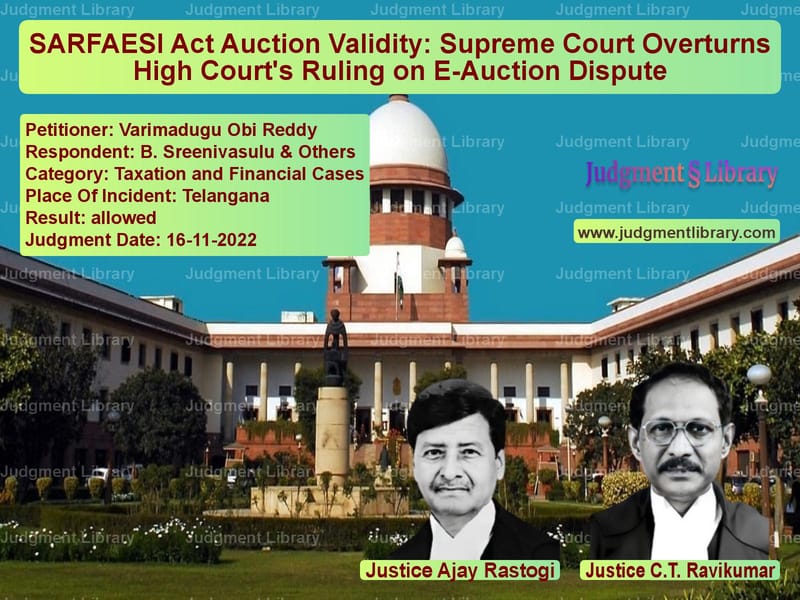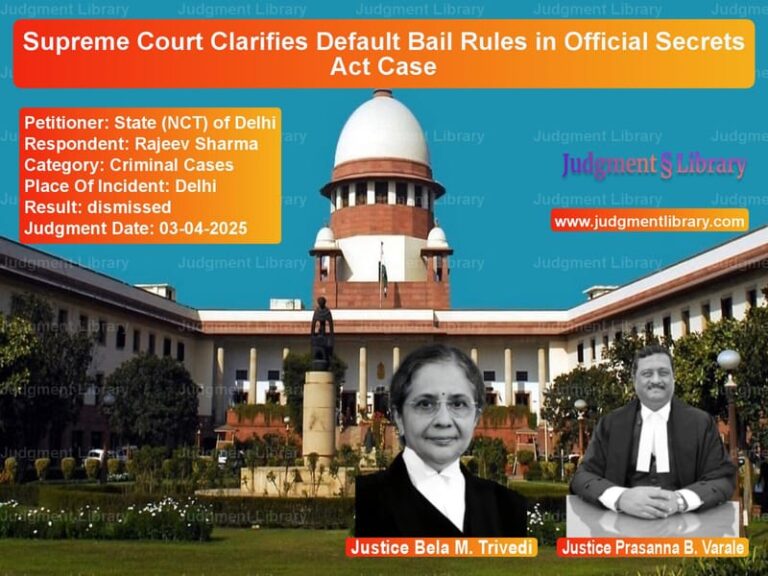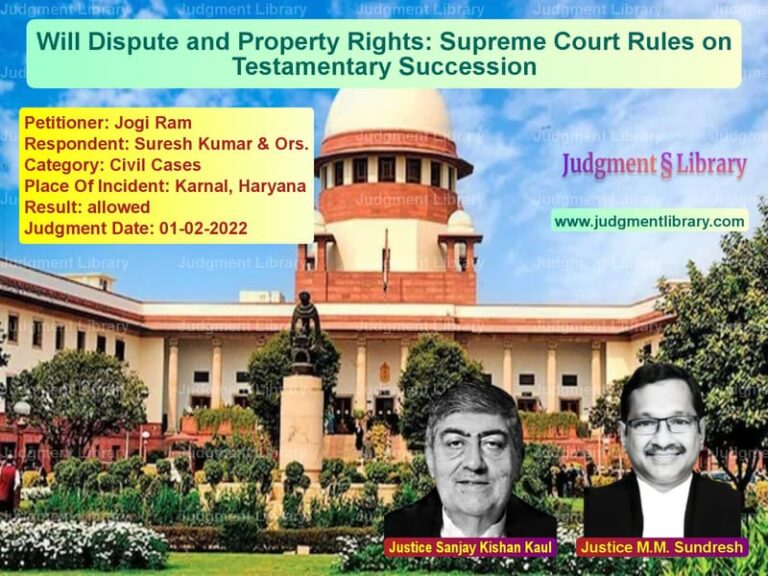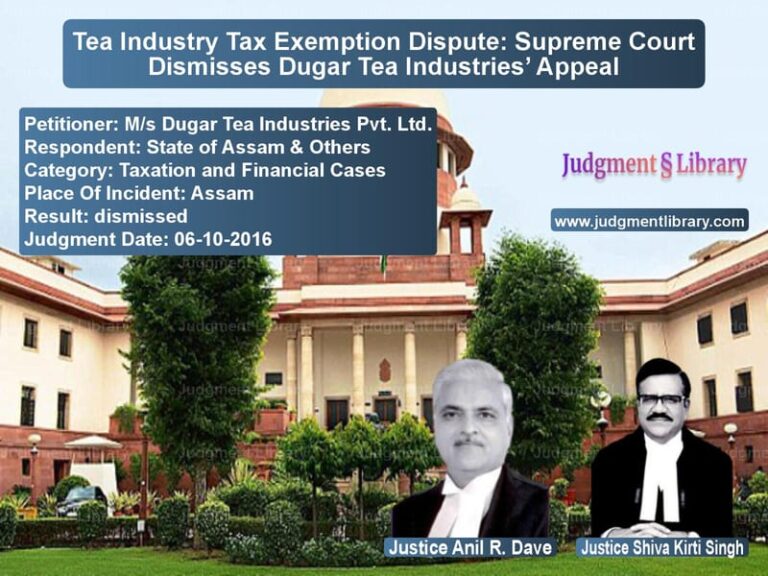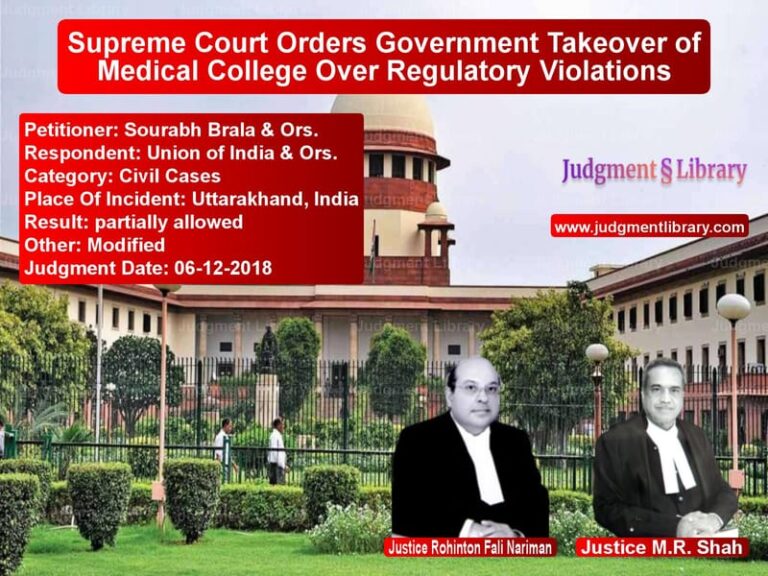SARFAESI Act Auction Validity: Supreme Court Overturns High Court’s Ruling on E-Auction Dispute
The Supreme Court of India recently delivered a critical judgment in the case of Varimadugu Obi Reddy v. B. Sreenivasulu & Others, addressing the validity of an e-auction sale conducted under the Securitisation and Reconstruction of Financial Assets and Enforcement of Security Interest Act, 2002 (SARFAESI Act). The case revolved around an auction purchaser challenging the High Court’s decision to annul the sale due to an alleged error in property description and delay in payment. Ultimately, the Supreme Court upheld the auction’s validity, reinforcing the importance of procedural compliance under SARFAESI.
The dispute arose when respondent borrowers, who had defaulted on their loan repayments, challenged the auction of their mortgaged property conducted by the respondent bank. The High Court of Telangana ruled in favor of the borrowers, setting aside the auction sale. However, the Supreme Court overturned this decision, ruling in favor of the auction purchaser.
Background of the Case
The case involves respondent borrowers who availed loans totaling Rs. 26 lakhs from the secured creditor bank. To secure the loan, respondent no. 4 stood as a guarantor and mortgaged her immovable property. After the borrowers defaulted on repayment, their accounts were classified as Non-Performing Assets (NPAs) on 30th September 2012, prompting the bank to initiate recovery proceedings under the SARFAESI Act.
After issuing demand notices and following the procedure laid down under the SARFAESI Act, the bank took possession of the mortgaged property and proceeded with an e-auction sale on 28th March 2015. The appellant, Varimadugu Obi Reddy, emerged as the highest bidder with an offer of Rs. 64,23,000/- and was issued a sale certificate. However, the borrowers challenged the sale before the High Court, citing errors in property description and non-compliance with Rule 9(4) of the Security Interest (Enforcement) Rules, 2002.
Petitioner’s (Auction Purchaser’s) Arguments
The petitioner, Varimadugu Obi Reddy, argued that the alleged discrepancy in the door number of the property was a typographical error and did not impact the auction process. He contended:
- From the commencement of proceedings under Section 13(2) of the SARFAESI Act, the mortgaged property was consistently described with proper measurements and boundaries, making any minor typographical error inconsequential.
- The borrowers never claimed any ambiguity regarding the property’s identity or that another property existed with the mistakenly written number.
- The delay in depositing 75% of the bid amount was due to the borrowers’ own legal interventions, and the bank had requested the petitioner to wait as negotiations were ongoing.
Respondent’s (Borrowers’) Arguments
The respondent borrowers contended:
- The property description error (wrong door number) misled bidders and prevented the property from fetching its true market value.
- The auction purchaser violated Rule 9(4) of the SARFAESI Rules by failing to deposit 75% of the bid amount within 15 days, thereby nullifying the auction.
- Since the petitioner deposited the amount on 15th April 2015, instead of the due date of 11th April 2015, the sale should be declared void.
Supreme Court’s Analysis
The Supreme Court analyzed two primary issues:
1. Property Description Error
“Mere typographical error in the property’s door number, without any resulting prejudice, does not render the entire auction process invalid.”
The Court found that the auction notice consistently provided detailed measurements and boundaries of the property. Since the borrowers failed to demonstrate any actual confusion among bidders, the Court ruled that the High Court erred in annulling the sale.
Read also: https://judgmentlibrary.com/supreme-court-rules-on-exim-policy-and-additional-licence-benefits/
2. Delay in Payment Under Rule 9(4)
“The period of 15 days in Rule 9(4) is not sacrosanct and can be extended if mutually agreed upon.”
The Court held that the delay in depositing the bid amount was due to legal complications initiated by the borrowers themselves. Additionally, the bank had asked the auction purchaser to delay payment, which was a reasonable justification for the four-day delay.
Final Judgment
The Supreme Court ruled in favor of the appellant, setting aside the High Court’s decision. The Court stated:
“The interference by the High Court was not legally sustainable. The auction was conducted in accordance with SARFAESI rules, and the minor delay in deposit was justified under the circumstances.”
Consequently, the appeal was allowed, and the auction sale was upheld. The Court also directed the bank to release Rs. 18.8 lakhs (remaining amount after loan adjustment) to the borrowers within eight weeks.
Conclusion
This judgment clarifies that minor procedural lapses, such as typographical errors in property descriptions, do not automatically invalidate an auction under SARFAESI. The ruling also affirms that the 15-day limit for payment under Rule 9(4) is flexible under reasonable circumstances. This case sets an important precedent for financial institutions and borrowers involved in SARFAESI proceedings.
Petitioner Name: Varimadugu Obi Reddy.Respondent Name: B. Sreenivasulu & Others.Judgment By: Justice Ajay Rastogi, Justice C.T. Ravikumar.Place Of Incident: Telangana.Judgment Date: 16-11-2022.
Don’t miss out on the full details! Download the complete judgment in PDF format below and gain valuable insights instantly!
Download Judgment: varimadugu-obi-reddy-vs-b.-sreenivasulu-&-ot-supreme-court-of-india-judgment-dated-16-11-2022.pdf
Directly Download Judgment: Directly download this Judgment
See all petitions in Banking Regulations
See all petitions in Debt Recovery
See all petitions in Judgment by Ajay Rastogi
See all petitions in Judgment by C.T. Ravikumar
See all petitions in allowed
See all petitions in supreme court of India judgments November 2022
See all petitions in 2022 judgments
See all posts in Taxation and Financial Cases Category
See all allowed petitions in Taxation and Financial Cases Category
See all Dismissed petitions in Taxation and Financial Cases Category
See all partially allowed petitions in Taxation and Financial Cases Category

